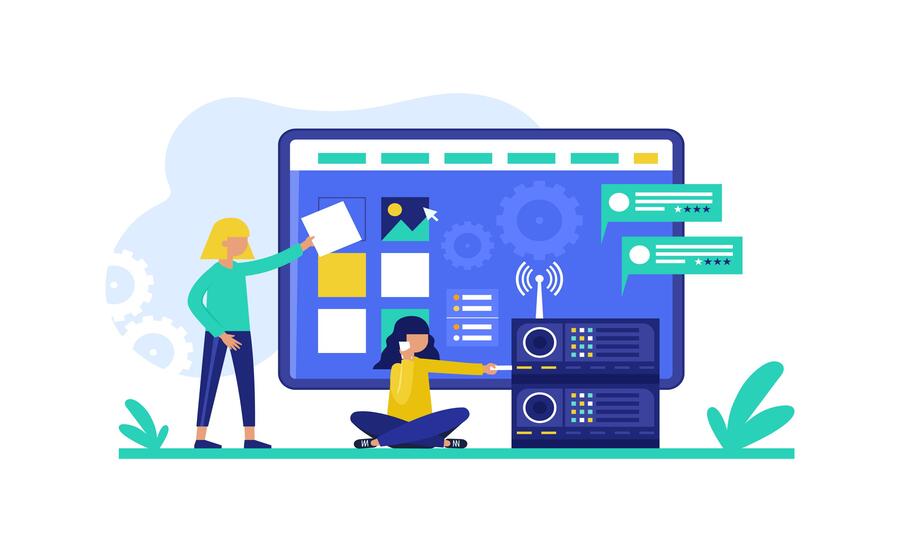
A custom web application is a specific software built for a company or a user developed according to their needs. It is made for one particular purpose. Customized web app development software is different from mobile apps. They don’t need to be downloaded from the play store. They can be accessed directly from the web browser.
The web apps are hosted on remote servers and are designed to be easily compatible with any operating system. Custom web application development is becoming an integral part of organizations to thrive and achieve success.
Process of Custom Web Applications Development
Several essential steps must be followed when developing a web app. The process of custom software development for the web is as follows:
Develop the Front-end:
Design and implement your web application’s user interface (UI) using HTML, CSS, and JavaScript. Ensure a responsive and intuitive design that provides an excellent user experience across different devices.
Build the Back-end:
Develop the server-side logic and functionality of your web application. Then, choose a suitable programming language and framework to handle data processing, business logic, and server interactions.
Implement Data Storage:
Determine the database system that best suits your application’s needs, such as relational databases like MySQL or PostgreSQL or NoSQL databases like MongoDB or Firebase. Store and retrieve data efficiently.
Integrate APIs and Services:
Incorporate third-party APIs and services to enhance your web application’s functionality. This can include payment gateways, social media integration, mapping services, and more.
Perform Testing and Debugging:
Thoroughly test your web application to identify and fix any bugs or issues. Conduct unit, integration, and user acceptance tests to ensure the application functions as intended.
Deploy and Host:
Choose a reliable web hosting provider and deploy your web application to make it accessible to users—Configure servers, domain names, and security measures to ensure a stable and secure deployment.
Monitor and Maintain:
Regularly monitor your web application’s performance, security, and user feedback. Then, apply updates, security patches, and feature enhancements to keep your application up to date.
Types of Web Applications
Customized web apps are used daily for a variety of purposes. Some of the types of custom web application development are as follows:
Content Management Systems
With the help of Content Management Systems, users can manage their website content at a central location. These platforms facilitate the creation, management, and publication of digital data. With the help of a CMS user friendly interface, users can create, edit, organize, and publish content on websites. They don’t even need technical expertise or coding knowledge. CMS helps manage both static and dynamic pages.
Social Networking Websites
Social networking websites are platforms where people can interact with each other digitally. The platforms provide a virtual community for people to develop relationships. Popular examples are:
- Snapchat.
Integrated Web Applications
An integrated web application is a unified platform that combines multiple functionalities and components from various systems or sources. It enhances user experience by seamlessly integrating software modules, databases, APIs, or external services within a web application. Although these applications can be complex, they still have various advantages.
E-commerce Sites
These websites are developed for companies that want to sell something online or have an online store. These platforms help individuals and businesses to buy products online. E-commerce websites can be customized according to the needs of users. Different features like product catalogs, payment ways, shopping carts, search engines, reports, and much more can also be added.
Key Features of Custom Web Application
Some of the key features of custom web application development are as follows:
- It consists of secure login and user management to ensure authorized success.
- Automation of repetitive tasks and processes to streamline operations. This helps to improve efficiency and saves time.
- Have responsive designs that provide that the application is adaptable across different devices.
- Easy to use and manage
- Apps can be customized according to the needs and requirements of the user. Customization functionality is available in web applications depending on conditions.
- It can be easily integrated with third party applications or APIs to extend the functionality of apps.
Conclusion
In conclusion, custom web application development services allow you to create a remarkable impression on your customers. Tailored exclusively for your brand, these cutting-edge web apps elevate your digital strategies and deliver exceptional user experiences. By streamlining operations, boosting productivity, and offering customization options, they become indispensable tools for success.
Custom web apps cater to various needs, from content management systems to social networking platforms, integrated applications, and e-commerce sites. They offer vital features that enhance functionality with a secure login, task automation, responsive design, and seamless integration with third-party applications. Embrace the power of custom web app development with ChetsApp to optimize your online presence and captivate your audience dynamically and positively.

